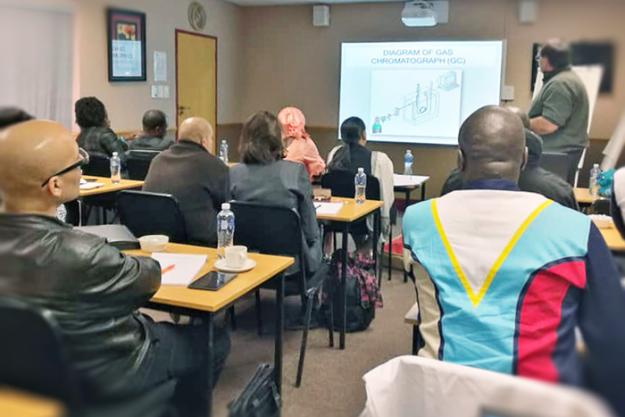
Chemistry professionals from African Member States enhanced their chemical analysis capabilities during an Analytical Chemistry Course
THE HAGUE, Netherlands – 22 May 2018 – Chemistry professionals from African Member States enhanced their chemical analysis capabilities during an Analytical Chemistry Course (ACC) jointly organised by the OPCW and Protechnik Laboratories of Armscor (Armaments Corporation of South Africa), held in Pretoria, South Africa from 7 to 18 May.
The participants were welcomed by Assistant Director of the Department of Trade and Industry, National Authority of South Africa to the OPCW, Ms Lebogang Philela; Senior Manager of Protechnik Laboratories, Dr Manilisi Shumane; Executive Manager of R&D Operations at Armscor, Ms Dikeledi Maema; and Ms Halimatussaadiah Mat Som, Programme Officer from OPCW’s Technical Secretariat.
The course covered topics including sample preparation, quality control, health and environmental issues related to toxic chemicals, physical chemical properties of chemical warfare agents and an overview of national implementation of the Chemical Weapons Convention (CWC).
In addition to theoretical knowledge, the course offered intensive hands-on exercises in the handling of different sample matrices for subsequent analysis by gas chromatography (GC) with element-selective detectors and gas chromatography-mass spectrometry (GC-MS). Participants also gained basic knowledge on the application of GC and GC-MS for the analysis of chemical samples in relation to the CWC.
The course provided a platform for participants to exchange their individual work experiences and challenges in GC and GC-MS techniques, including hardware, instrument testing and optimization, basic instrument maintenance and trouble-shooting.
The course – modelled on the Analytical Skills Development Course (ASDC) by the respectable VERIFIN Institute in Finland – has been held annually since 2009 to better support National Authorities in implementing the CWC.
The programme welcomed 20 participants from: Algeria, Botswana, Burkina Faso, Cameroon, Democratic Republic of the Congo, Ethiopia, Ghana, Kenya, Malawi, Mauritius, Morocco, Namibia, Nigeria, Senegal, Sudan, Tanzania, Tunisia, Uganda, Zambia and Zimbabwe.
Background
The Analytical Chemistry Courses are designed to build and extend the capacity of laboratories in the countries in Africa to analyse chemicals relevant to the Chemical Weapons Convention (CWC).
The courses are part of a larger OPCW’s Africa Programme that strives to strengthen the Organisation’s cooperation with its Member States from Africa.
Established in 2007, Africa Programme aims to respond to the particular needs of African countries. The activities include capacity building and raising awareness of the CWC, through cooperation with the African Union and outreach to civil society and academic institutions.
The Components of an Agreed Framework for the Full Implementation of Article XI were established by the decision of the Conference of States Parties in 2011 (C-16/DEC.10 dated 1 December 2011).
As the implementing body for the Chemical Weapons Convention, the OPCW oversees the global endeavour to permanently and verifiably eliminate chemical weapons. Since the Convention’s entry into force in 1997 – and with its 192 States Parties – it is the most successful disarmament treaty eliminating an entire class of weapons of mass destruction.
Over 96% of all chemical weapon stockpiles declared by possessor States have been destroyed under OPCW verification. For its extensive efforts in eliminating chemical weapons, the OPCW received the 2013 Nobel Peace Prize.
